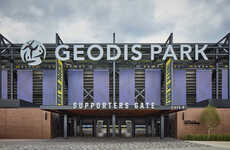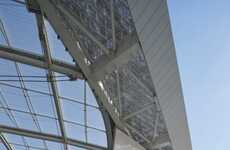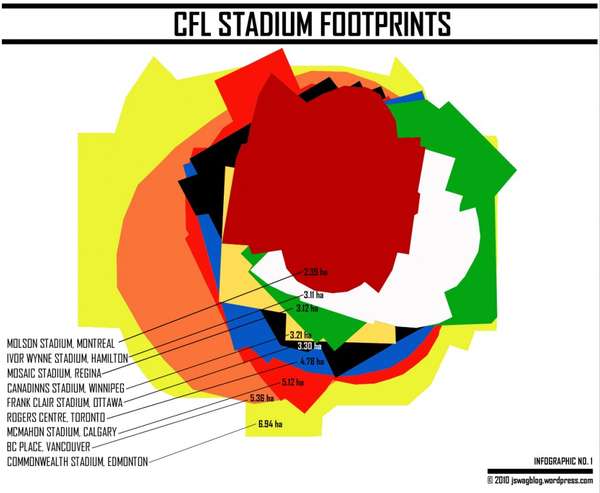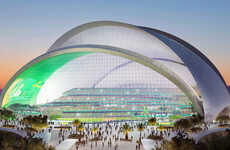
The 2012 Grey Cup Featured the League’s 4th Biggest St
Jonathon Brown — November 26, 2012 — Eco
References: visual.ly
Following yesterday’s 2012 Grey Cup in Toronto, here is a look at the footprints of every CFL stadium.
Last night’s 100th Grey Cup featured the Calgary Stampeders and the Toronto Argonauts in front of a capacity crowd inside the Rogers Center. While upwards of 50,000 people rammed into the stadium, it actually ranks in the middle of the pack in terms of size according to this infographic courtesy of Jswagblog.wordpress.com.
At 5.12 ha (hectares), the Rogers Center hosted the 2012 Grey Cup with more space than five other stadiums in the CFL’s nine team league.
Montreal’s Molson Stadium comes in as the smallest stadium in the league with only 2.38 ha. Ranking above Toronto’s Rogers Center are McMahon Stadium in Calgary, BC Place in Vancouver and Commonwealth Stadium in Edmonton.
Last night’s 100th Grey Cup featured the Calgary Stampeders and the Toronto Argonauts in front of a capacity crowd inside the Rogers Center. While upwards of 50,000 people rammed into the stadium, it actually ranks in the middle of the pack in terms of size according to this infographic courtesy of Jswagblog.wordpress.com.
At 5.12 ha (hectares), the Rogers Center hosted the 2012 Grey Cup with more space than five other stadiums in the CFL’s nine team league.
Montreal’s Molson Stadium comes in as the smallest stadium in the league with only 2.38 ha. Ranking above Toronto’s Rogers Center are McMahon Stadium in Calgary, BC Place in Vancouver and Commonwealth Stadium in Edmonton.
Trend Themes
1. Increasing Stadium Sizes - As CFL teams strive to attract larger crowds, there is a trend towards increasing the size of stadium footprints, providing opportunities for innovative infrastructure designs and fan experiences.
2. Optimizing Space Utilization - Smaller stadiums like Montreal's Molson Stadium highlight the need for efficient use of space, prompting innovative solutions for maximizing seating capacity and revenue generation.
3. Comparing Stadium Footprints - The availability of footprints data for CFL stadiums allows for trend analysis and benchmarking, enabling businesses to gain insights into the market and identify potential opportunities for growth.
Industry Implications
1. Sports Facilities - The sports facilities industry can leverage the trend of increasing stadium sizes to develop cutting-edge designs and technologies that enhance the fan experience and generate higher revenues.
2. Architectural Design - Architectural firms specializing in stadium design can capitalize on the need for efficient space utilization by developing innovative seating configurations and multi-purpose facilities.
3. Sports Analytics - Sports analytics companies can leverage the availability of stadium footprint data to provide insights and consulting services to CFL teams, helping them make informed decisions regarding stadium size and scale.
0.6
Score
Popularity
Activity
Freshness
























